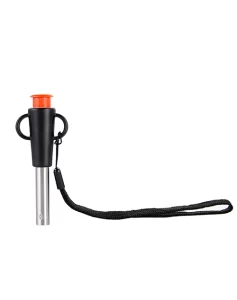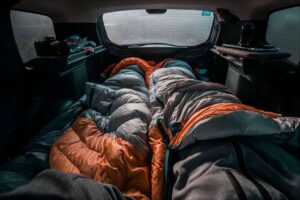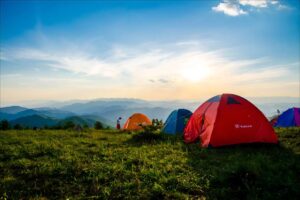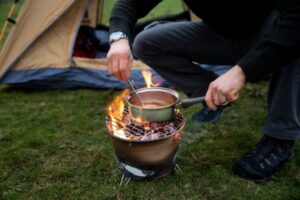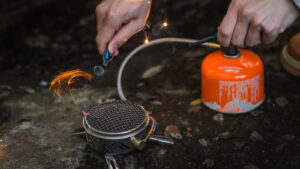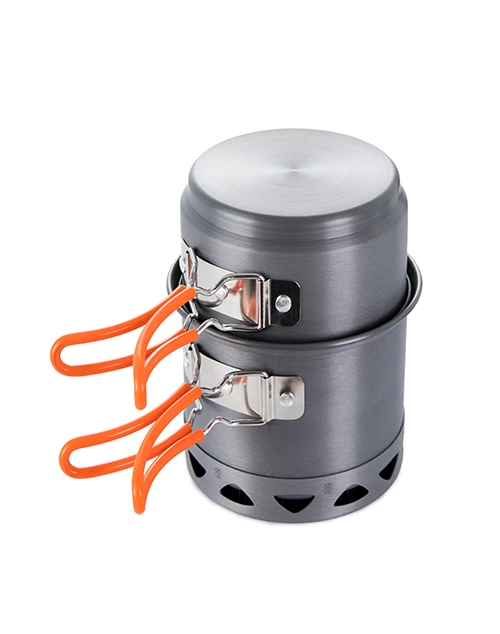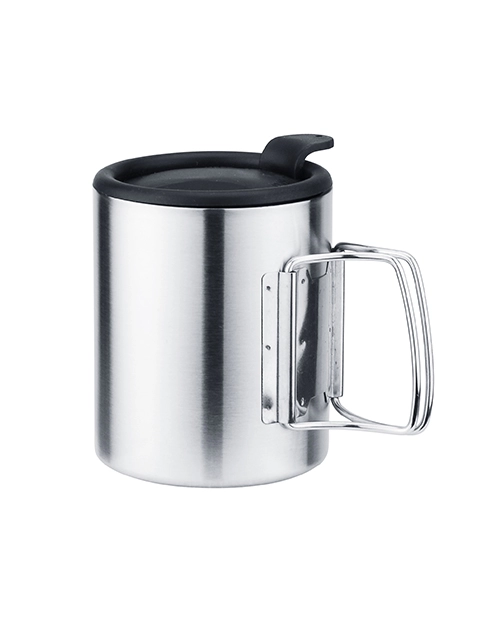Camping Alone: Tips for Your Solo Camping Trips
Share:
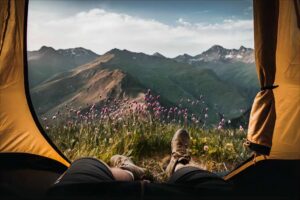 Camping is often thought of as a bonding activity, but it may also be enjoyable on its own. Solo camping allows you to escape your daily routine and practice mindfulness while relaxing and reconnecting with nature.
Camping is often thought of as a bonding activity, but it may also be enjoyable on its own. Solo camping allows you to escape your daily routine and practice mindfulness while relaxing and reconnecting with nature.
Sometimes camping alone is simply better for your mental health. You may skip arranging schedules or worrying about having adequate equipment, food, and sleeping bags. You are responsible for your own meals, which means you may eat anything you want, and you can participate in any of your favorite relaxation activities.
Go camping on your own leisure. Learn about the advantages of camping alone with our solo camping checklist:
The Benefits of Solo Camping
Camping is a great hobby to enjoy with family and friends. However, going out into the woods for a solitary camping excursion provides seclusion that a group camping trip does not. Even a weekend excursion to the woods may work wonders.
When you camp alone, you will spend your time around the fire meditating on life rather than telling stories, but your time will be very valuable anyway. The following are the advantages of solo camping for beginners.
- Going at your own pace.
When you go hiking with a group or partake in another rigorous sport, everyone has different expectations about how quickly or far you will go. When there is a large enough group, individuals tend to split out into smaller groups or couples and move at different speeds.
It’s difficult to find a group in which everyone is on the same level. When camping alone, it is unnecessary to coordinate activities with others. You may go without having to regroup at a specific time and take your time when you wish. You may hike rapidly or leisurely, and stay up as late as you like.
- Learn to Camp Like a Pro
When camping in a group, one individual generally takes the lead and does the majority of the labor. It is normal to observe people setting up tents on their own. Perhaps another individual always takes the initiative to light and manage the campfire. You could even have someone with an excellent sense of direction.
When camping alone, you are solely responsible for your actions. Having to do everything is the best way to learn about camping. It will push you outside of your comfort zone and challenge you to be more self-sufficient than you would typically be. The benefits and sense of success more than compensate for the isolation of a solo camping excursion. You’ll never be the same after seeing the sun rise over the horizon from your tent, sipping coffee prepared over the bonfire you kindled!
- More of a connection to nature
When camping in a group, you become immersed in talks and form stronger emotional bonds. You must ensure that everyone is happy throughout the journey and arrange food and rest breaks. You end up devoting a significant amount of your energy to bonding with the members of your group.
Solo camping allows you to connect with nature without being distracted by people. This can lead to increased awareness and greater connection. You can see and enjoy everything around you without any noise or disturbances. You could even discover that you appreciate the surroundings more when you’re alone.
- Increased self-confidence.
When you camp as a group, people will help you with tasks that you are uncomfortable with. Maybe you don’t have much experience with equipment or technical abilities, which is why solo camping can be both a challenge and a big confidence booster when you learn new things.
When camping alone, you can only rely on yourself. You must ensure that you have packed all of the necessary items and be prepared to improvise if you forget anything. Going on a journey alone helps you gain greater confidence in yourself.
- Lower potential stressors
The burden of ensuring that everyone in your group is safe and gets along is always a concern at a camping party. A single argument or incident might have a significant impact on the overall experience.
Camping alone may have its own set of pressures, but you may escape the ones that come with being surrounded by others. Allow yourself to unwind apart from the social pressures of the outer world.
Top first-time solo camping tips
Now that you’ve learned about the great benefits of solo camping, you’re nearly ready to set off on your adventure and reap the blessings of this time to yourself. However, one more thing: read the solo camping advice below and follow them to guarantee a safe and fun camping vacation.
- Build your way up to going solo.
Your first solo camping excursion should not be to a remote wilderness region. As they say, practice makes perfect, and you don’t want to overload yourself the first time around. Solo camping necessitates a variety of abilities, and beginning small is the best way to go.
Solo camping is best suited for people who have previously camped in a group. It’s also a good idea to go solo camping in familiar locations to reduce the risk of getting lost or meeting an unanticipated threat.
Build your way up to more challenging camping circumstances. For example, if you want to practice lighting a fire, carry some backup equipment in case your flint fails. Even experienced campers have problems from time to time, so it’s better to start with the fundamentals.
It won’t be long before you find yourself taking longer treks into more remote areas, but make sure your abilities are up to par first.
- Feel confident about your camping skills
Knowing the basics is crucial to camping alone, but you need to feel like your skill level goes beyond a beginner’s.
To successfully camp alone, you need to know how to do these important solo camping activities:
- Navigate
- Pitch a tent
- Build a fire
- Clean water, in case your supply runs out and you need to rely on creek water
- Set up camp
- Handle run-ins with wildlife, including big predators like bears
- Forecast weather so you do not end up stuck in a storm
- Deal with injuries and other things requiring first aid
Other things would be great to know before going out on your own, but the above list is the bare minimum you must be able to check off before you even think about heading out solo.
3 Lighten Your Load.
Because you just have yourself to pack and unpack, be aware of what you bring. You just need enough for yourself, so be practical while packing for your camping trip.
Rather of hauling a tent and sleeping mat, many solitary campers prefer a hammock that just requires a sleeping bag. If you prefer a tent, choose a lightweight one designed for one person.
- Take safety precautions.
It’s always better to be safe than sorry, especially when you’re out in nature alone. Bring an emergency device, satellite phone, or personal locating beacon with you. A satellite phone is an excellent method to check in with friends and family back home on a regular basis, allowing them to rest easy knowing you are secure. If you intend to hike or explore the region surrounding your campsite while solo camping, avoid taking any extra risks. You will not want to cope with even a minor injury such as a sprained ankle. Remind yourself to go more slowly through the surroundings to reduce your chance of harm and to fully appreciate nature’s beauty.
- Camp without using electronics.
If you’re comfortable camping alone, here’s a challenge. Keep your gadgets in your bag. Not only will you likely have poor coverage on your journey, but focusing on your environment is one of the most effective methods to replenish your mental batteries. You’ll miss your favorite music less if you learn to love the sounds of nature. Unplugging from our increasingly technology-dependent culture is critical to our overall well-being. Constant bombardment with emails, text messages, notifications, and social media updates can have a detrimental impact on your view on life. The first lack of such things while camping alone may be surprising, but you may soon learn that it provides you a greater inner calm.
- Always put your safety first!
When going camping, always make a plan ahead of time. Make sure you enter the wilderness alone, with an escape plan. Know how to get out and where you may receive aid if required. Make sure you understand what safety precautions to take, such as if you are in bear area, and who to call for emergency assistance.
Conclusion
While many people believe that solo camping is difficult and only for professional campers, as seen above, it is achievable. As long as you’re prepared, there’s no reason you can’t go out and connect with nature on your own.
Camping alone is one of the loveliest experiences you can have since it allows you to connect with yourself and nature in ways you never thought possible.
1. Tent pitching skills
Setting up a tent is a basic skill for camping. Here are the detailed steps:
First, choose a suitable location, make sure the ground is flat, away from water sources, and avoid low-lying areas because these places may accumulate water when it rains.
Then clean the ground before setting up the tent, such as branches, stones and other obstacles on the ground, to ensure a comfortable sleep.
Finally, follow the instructions in the tent manual. First, insert the tent poles into the designated slots, then secure the four corners of the tent. Make sure the tent ropes are tied tightly to prevent the tent from loosening in windy conditions.
If rain is expected, use a waterproof tarp or apply a waterproof coating to the tent to prevent water from seeping in.
2. Bonfire skills
Prepare materials: Collect dry branches, leaves, and small pieces of wood as kindling. Prepare a few thick logs to maintain the fire.
Build a fire: You can use a “pyramid” or “wood pile” to arrange the wood. First use small sticks and dry leaves as a foundation, and then pile up larger pieces of wood.
Ignition: Use matches or lighters to light the kindling. Once the fire starts to burn, slowly add larger pieces of wood to keep the flame stable.
Safety Measures: Ensure there are no flammable items near the bonfire to prevent it from getting out of control. Stay with the fire after lighting it, and make sure it is completely extinguished before leaving.
Handheld Electric Igniter for Canister Stove
3. Wilderness navigation
Map and Compass: In areas where there is no mobile phone signal, traditional maps and compasses are essential tools. Be sure to learn how to use a compass ahead of time and combine it with a map to determine your direction.
Terrain Recognition: Learn to interpret the terrain and identify landmarks like mountains and rivers. This can help you find your way back to camp if you get lost.
GPS Device: If possible, use a portable GPS device for navigation. Make sure the device is fully charged and has a backup battery before departure.
4. Solo camping in different environments
Camping in the mountains: Mountain camping is usually cooler and the temperature drops significantly at night. Be sure to bring warm equipment, especially sleeping bags and windproof tents suitable for low temperatures. In addition, the terrain of mountain camping is complex, pay attention to whether the ground is solid, and avoid setting up tents on slopes or soft ground.
Forest Camping: In the forest, you may encounter various wild animals, so food must be stored in sealed containers and hung at least 2 meters above the ground. Forests are often home to many mosquitoes, so carrying mosquito repellent is essential.
Beach Camping: The environment for beach camping is generally mild, but you need to be mindful of tidal changes. When selecting a campsite, ensure it is far enough from the waterline, and use windproof stakes to reinforce the tent, as seaside winds can be quite strong.
FAQ
1. How do I prepare for my first solo camping trip?
Preparation for your first solo camping trip involves:
- Start small: Choose a familiar or easily accessible location, such as a local campsite or state park, to build your confidence.
- Check the weather: Ensure you have appropriate gear for any weather conditions.
- Plan thoroughly: Pack enough food, water, and essential items (tent, sleeping bag, stove). Inform someone of your itinerary.
- Practice basic skills: Learn to set up your tent, start a fire, and navigate using a map and compass.
2. Is solo camping safe?
Yes, solo camping can be safe as long as you take the right precautions:
- Choose a safe location: Stick to well-established campsites or parks with clear safety guidelines.
- Be aware of wildlife: Understand the local wildlife and keep food stored properly to avoid attracting animals.
- Bring safety gear: Carry a first aid kit, bear spray (if needed), and communication devices like a satellite phone or emergency beacon.
3. What should I pack for a solo camping trip?
Essentials to pack include:
- Tent and sleeping gear: Lightweight tent, sleeping bag, and pad.
- Food and water: Pre-pack meals and bring a portable water filter.
- Clothing: Weather-appropriate layers, waterproof clothing, and comfortable hiking boots.
- Navigation tools: Map, compass, and GPS device.
- Safety items: First aid kit, fire-starting tools, flashlight, and knife.
4. What are the challenges of solo camping?
Some challenges include:
- Loneliness: Solo camping can feel isolating if you’re not used to spending time alone.
- Self-sufficiency: You are responsible for all tasks, from setting up camp to cooking and dealing with emergencies.
- Navigation: Finding your way can be challenging without a group to support you, so practice navigation skills.
5. How can I overcome my fear of camping alone?
- Start in familiar areas: Begin solo camping in places where you feel comfortable.
- Take safety precautions: Equip yourself with necessary safety gear to feel more secure.
- Gradually increase difficulty: Begin with shorter, easier trips and work your way up to more remote locations.
- Stay connected: Bring a communication device to stay in touch with someone back home for peace of mind.
6. What are the best solo camping destinations?
Some great destinations for solo camping include:
- National Parks: Places like Yellowstone or Yosemite are well-maintained with ranger services and facilities.
- State parks: Many state parks offer beautiful, less crowded sites for solo camping.
- Wilderness areas: For more experienced solo campers, the Boundary Waters Canoe Area or Appalachian Trail can provide a deeper wilderness experience.
Other related articles recommended:
Is Titanium Cookware Safe?
The Best Camping Chairs For Seniors and Older Adults
Outdoor Camping Kitchen Ideas: 6 Easy Ways
How to Stay Cool While Camping?
The Best Utensils to Use with Stainless Steel Cookware
Effortless Camping Kitchen Storage Ideas to Simplify Your Outdoor Experience
ODM service
Looking for reliable wholesale outdoor equipment? At Deermaple, we specialize in ODM service, offering high-quality, innovative outdoor gear tailored to your needs.
If you are interested in outdoor gear wholesale, please contact us.
Disclaimer: This blog may contain user comments, opinions, and other user-generated content. We are not responsible for the accuracy, reliability, or opinions of user-generated content. User-generated content represents the opinions of the individual authors only and does not reflect the views of this website.
Edwary
Related Posts
Related Products
No products found.

